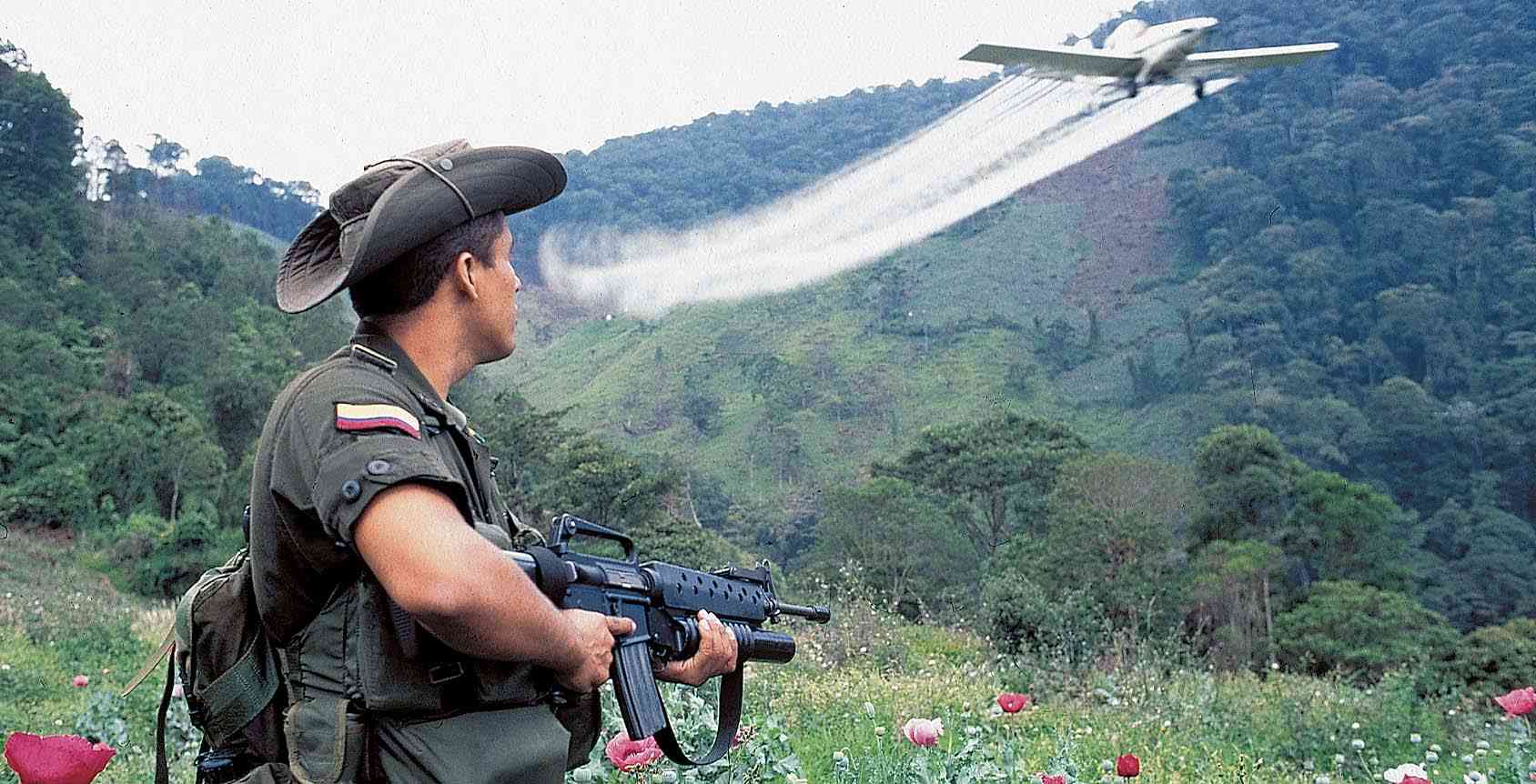Colombia: Glyphosate aerial spraying forces communities to seek legal action

The processes of voluntary eradication of illicit crops are supported, but marginally, compared to the force eradication operations prioritized by the government. As part of his war on drugs policy, Duque claims the continuation of glyphosate aerial spraying from June.
Point 4 of the Peace Agreement establishes that voluntary substitution processes with communities must be carried out as a priority, conditioning the use of force eradication on two events: that there are cultivators not demonstrating not their intention of substitution or that they do not fulfill the compromises acquired.
Despite this clear provision in the Agreement, Duque’s government suspended the attachment of families to the voluntary substitution program. During the Santos government, substitution agreements with 99,097 families took place; since Duque assumed the presidency, voluntary substitution agreements have not been held.
According to the records of the United Nations Office on Drugs and Crime – UNODC, as of August 31, 2020, 42,339 hectares of illicit crops had been voluntarily eradicated, with a reseeding percentage of 0.2%. As of November 2020, 107,229 hectares had been forcibly eradicated, with a reseeding index of 30%1.
The communities have expressed their willingness to substitute and, from the many instances, have appealed to the government to be admitted to the voluntary substitution program, however, the director of the Agencia de Renovación del Territorio – ART reported that there are no sufficient resources to include more families in the program2.
Due to this situation, communities had to resort to legal action to slow down eradication by force. As of September 2020, complaints have been lodged in 8 departments: Cauca, Nariño, Caquetá, Guaviare, Meta, Norte de Santander, Córdoba and Putumayo. In almost all the acts, the pronouncements are for the communities and the order for the government is to comply with the Peace Agreement and establish voluntary substitution agreements.
Notwithstanding, the government continues to bow down through eradication by force. In early April, the decree regulating glyphosate aerial spraying was promulgated and authorities are preparing to resume spraying in June.
Glyphosate aerial spraying has been a suspended practice in Colombia since 2015 due to adverse effects on health. In 2017, the Constitutional Court made the resumption of these activities conditional on the fulfillment of 6 environmental health requirements.
To comply with the conditions imposed by the High Court, on April 12 a decree regulating glyphosate aerial spraying was promulgated. Likewise, the Autoridad Nacional de Licencias Ambientales – ANLA has approved the modification of the Environmental Management Plan of the Program of Eradication by Glyphosate Aerial Spraying – PECIG, in Spanish.
Ethnic communities, peasants and social organizations have submitted to the Constitutional Court a petition supporting the prior consultation in the territories on the glyphosate spraying. They also demanded that the pronouncements and recommendations of international organizations that oppose the use of the herbicide be considered.
Regarding the decision of resuming glyphosate aerial spraying, social organizations reported that “the national government insists on breaking up the Peace Agreement and trampling the confidence of communities that have respected what has been agreed despite the failings from the government and the fact that of the 99,907 families who signed up to voluntary substitution agreements, only 67,665 were listened to. Thus, families expressing their willingness to join have not always been heard, on the other hand, they have been revictimized by the terror of the police”3.
In September 2020, the US government certified Colombia in its fight against drugs. The certification memorandum coincides with what was established in the “Five-Year Plan” signed by the two countries, with the objective of reducing coca cultivation to half in 5 years. In fact, it points out that, to accomplish this goal, Colombia must move forward in resuming aerial eradication of crops for illicit use4.
1 UNODC (2020). Informe Ejecutivo PNIS No. 22. Monitoreo a la implementación del Plan de Atención inmediata – componente familiar. Consulté sur : 31 août 2020. Available at: https://www.unodc.org/documents/colombia/2020/Octubre/Informe_Ejecutivo_No._22.pdf
2 El Nuevo Siglo (2021) “No es posible ampliar el programa de sustitución de cultivos” Available at : https://www.elnuevosiglo.com.co/articulos/04-16-2021-no-es-posible-ampliar-el-programa-de-sustitucion-de-cultivos-con-este-modelo
3 Coordinadora Nacional de Cultivadores de Coca, Amapola y Marihuana – COCCAM (2021) Rechazo a la reanudación de fumigación con glifosato
4Secretaría Técnica del Componente Internacional de Verificación CINEP/PPP-CERAC (2021) Octavo Informe de verificación de la implementación del Acuerdo Final de Paz en Colombia. Available at: https://www.cinep.org.co/Home2/component/k2/864-octavo-informe-de-verificacion-de-la-implementacion-del-acuerdo-final-de-paz-en-colombia.html
